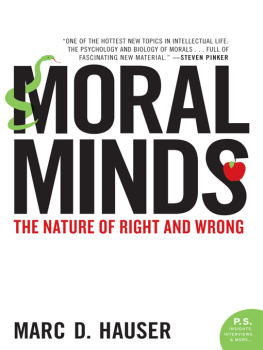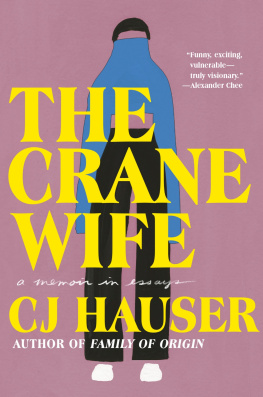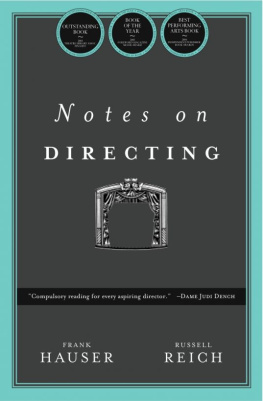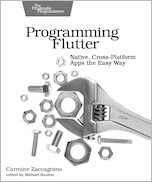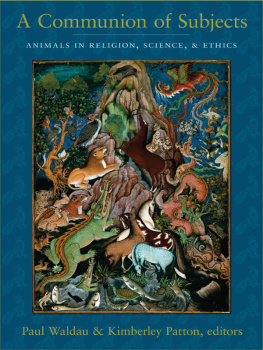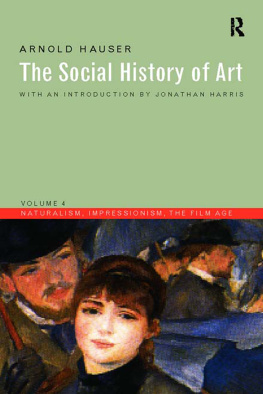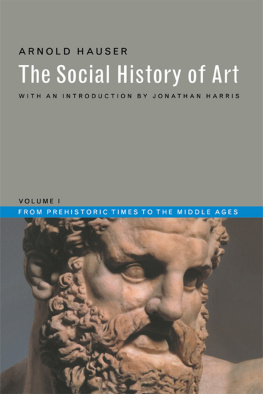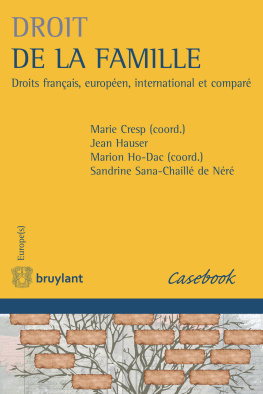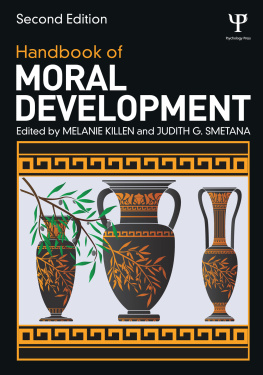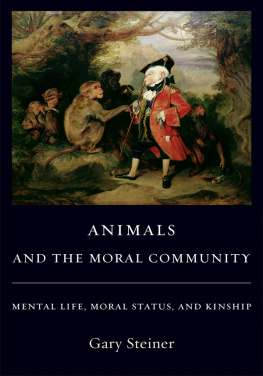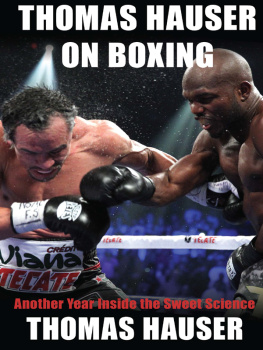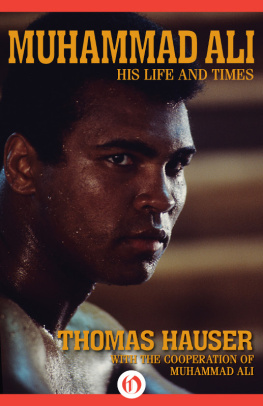Marc D. Hauser
O F ALL THE DIFFERENCES between man and the lower animals, the moral sense or conscience is by far the most important[I]t is summed up in that short but imperious word ought, so full of high significance. It is the most noble of all the attributes of man, leading him without a moments hesitation to risk his life for that of a fellow-creature; or after due deliberation, impelled simply by the deep feeling of right or duty, to sacrifice it in some great cause.
M ORALS EXCITE PASSIONS , and produce or prevent actions. Reason of itself is utterly impotent in this particular. The rules of morality, therefore, are not conclusions of our reason.
W HY DOES EVERYONE take for granted that we dont learn to grow arms, but rather, are designed to grow arms? Similarly, we should conclude that in the case of the development of moral systems, theres a biological endowment which in effect requires us to develop a system of moral judgment and a theory of justice, if you like, that in fact has detailed applicability over an enormous range.
T HE CENTRAL IDEA of this book is simple: we evolved a moral instinct, a capacity that naturally grows within each child, designed to generate rapid judgments about what is morally right or wrong based on an unconscious grammar of action. Part of this machinery was designed by the blind hand of Darwinian selection millions of years before our species evolved; other parts were added or upgraded over the evolutionary history of our species, and are unique both to humans and to our moral psychology. These ideas draw on insights from another instinct: language.
The revolution in linguistics, catalyzed by Noam Chomsky in the 1950slanguage, we speak and comprehend what others say without reasoning and without conscious access to the underlying rules or principles. I argue that our moral faculty is equipped with a universal moral grammar, a toolkit for building specific moral systems. Once we have acquired our cultures specific moral normsa process that is more like growing a limb than sitting in Sunday school and learning about vices and virtueswe judge whether actions are permissible, obligatory, or forbidden, without conscious reasoning and without explicit access to the underlying principles.
At the core of the book is a radical rethinking of our ideas on morality, which is based on the analogy to language, supported by an explosion of recent scientific evidence. Our moral instincts are immune to the explicitly articulated commandments handed down by religions and governments. Sometimes our moral intuitions will converge with those that culture spells out, and sometimes they will diverge. An understanding of our moral instincts is long overdue.
The framework I pursue in Moral Minds follows in a tradition that dates back to Galileo, has been accepted by most physicists, chemists, and a handful of natural and social scientists. It is a stance that starts by recognizing the complexity of the world, admitting the futility of attempts to provide a full description. Humbled by this recognition, the best way forward is to extract a small corner of the problem, adopt a few simplifying assumptions, and attempt to gain some understanding by moving deeply into this space. To understand our moral psychology, I will not explore all of the ways in which we use it in our daily interactions with others. In the same way that linguists in the Chomskyan tradition sidestep issues of language use, focusing instead on the unconscious knowledge that gives each of us the competence to express and judge a limitless number of sentences, I adopt a similarly narrow focus with respect to morality. The result is a richly detailed explanation of how an unconscious and universal moral grammar underlies our judgments of right and wrong.
To show the inner workings of our moral instincts, consider an example. A greedy uncle stands to gain a considerable amount of money if his young nephew dies. In one version of the story, the uncle walks down the hall to the bathroom, intending to drown his nephew in the bathtub, and he does. In a second version, the uncle walks down the hall, intending to drown his nephew, but finds him facedown in the water, already drowning. The uncle closes the door and lets his nephew drown. Both versions of the story have the same unhappy ending: the nephew dies. The uncle has the same intention, but in the first version he directly fulfills it and in the second he does not. Would you be satisfied if a jury found the uncle guilty in story one, but not in story two? Somehow this judgment rings false, counter to our moral intuitions. The uncle seems equally responsible for his actions and omissions, and the negative consequences they yield. And if this intuition holds for the uncle, why not for any moral conflict where there is a distinction between an action with negative consequences and an omission of an action with the same negative consequences?
Now consider euthanasia, and the American Medical Associations policy: The intentional termination of the life of one human being by anothermercy killingis contrary to that for which the medical profession stands and is contrary to the policy of the American Medical Association. The cessation of the employment of extraordinary means to prolong the life of the body when there is irrefutable evidence that biological death is imminent is the decision of the patient and/or his immediate family. Stripped to its essence, a doctor is forbidden from ending a patients life but is permitted to end life support. Actions are treated in one way, omissions in another. Does this clearly reasoned distinction, supported by most countries with such a policy, fit our moral intuitions? Speaking for my own intuition: No.
These two cases bring three issues to light: legal policies often ignore or cover up essential psychological distinctions, such as our inherent bias to treat actions one way and omissions another way; once the distinctions are clarified, they often conflict with our moral intuitions; and when policy and intuition conflict, policy is in trouble. One of the best-kept secrets of the medical community is that mercy killings in the United States and Europe have risen dramatically in the last ten years even though policies remained unchanged. Doctors are following their intuitions against policy and the threat of medical malpractice. In cases where doctors adhere to policy, they tend to fall squarely within the AMAs act-omission bias. For example, in June of 2004, an Oregon doctor explicitly opposed to his states tolerance for mercy killings through drug overdose stated: I went into medicine to help people. I didnt go into medicine to give people a prescription for them to die. It is okay to help a patient by ending his life support, but it is not acceptable to help the patient by administering an overdose. The logic rings false. As the American response to the Terry Schiavo case revealed in 2005, many see termination of life support as an act, one that is morally wrong. And for many in the United States, moral wrongs are equated with religious wrongs, acts that violate the word of God. As Henry Wadsworth Longfellow noted, echoing a majority voice concerning the necessity of religion as a guiding light for morality, Morality without religion is only a kind of dead reckoningan endeavor to find our place on a cloudy sea by measuring the distance we have run, but without any observation of the heavenly bodies. I will argue that this marriage between morality and religion is not only forced but unnecessary, crying out for a divorce.

